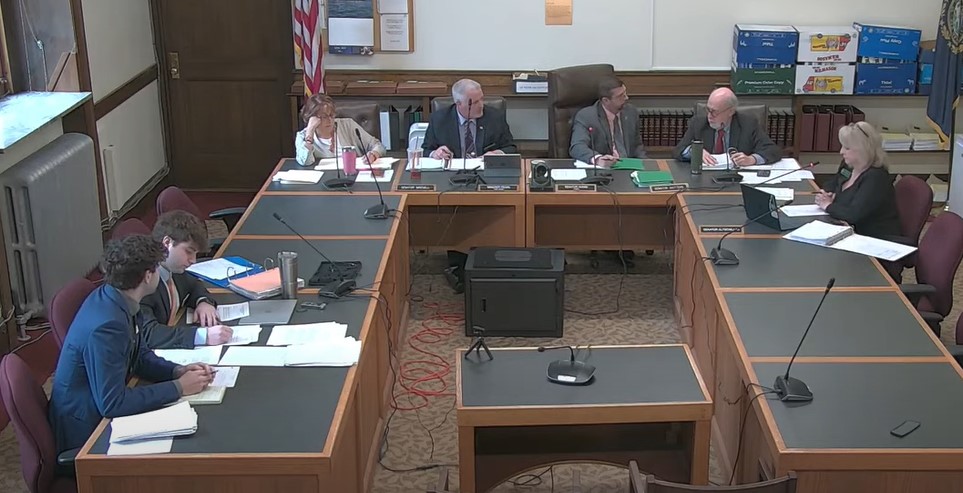By PAULA TRACY, InDepthNH.org
CONCORD – A bill related to the siting of new landfills in the state – which has passed the House – was heard by a Senate committee Tuesday with opposition expressed from the landfill industry, geologists, and the state Department of Environmental Services.
House Bill 56 https://www.gencourt.state.nh.us/bill_status/billinfo.aspx?id=160&inflect=2 would establish a formula aimed at keeping migrating material – or leachate – out of water sources in the state.
The Senate Energy and Natural Resources Committee recommendation for HB 56 was inexpedient to legislate by a party line vote of 3-2. Then, it will head to the Senate floor for debate and a vote.
It would establish a five-year setback from waterbodies, meaning that it should take five years for any escaping material from a landfill to reach a perennial river, lake, or coastal waterway.
It passed with an amendment on the House floor on March 22 on a vote of 224-155.
The bill was opposed by the solid waste industry, whose members said they favor Senate Bill 61, which passed to the House to study the issue.
State Rep. Peter Bixby, D-Dover, said they worked with the House committee on the bill to ensure that it does not apply to existing landfills interested in expansion.
He said what is most important is protecting state surface waters and groundwater.
Rep. David Rochefort, R-Littleton also came to support the bill. He called it a “common sense approach” and said his town is developing its river district.
Rochefort called the current setback for the landfill from water bodies of 200 feet arbitrary and inadequate.
He said he thinks the bill pairs well with the bill coming out of the Senate to study.
Rep. Rosemary Rung, D-Merrimack agreed. She noted that Merrimack has suffered from PFAS water contamination from an industrial source, Saint Gobain.
Nora Bosworth of the Conservation Law Foundation also supported the bill. She said because of the documented health effects of contamination from landfills it is important to protect the public from escaping material.
“The bill will direct the siting and ensure there is sufficient time to remediate the problem before it reaches a waterbody,” she said.
But Mike Wimsatt and Mark Sanborn both from New Hampshire Department of Environmental Services, said the department has concerns about the bill and like the industry, preferred the study committee recommended under Senate Bill 61 which is now before the House.
Wimsatt said the bill has specifications for siting related to “sand and gravel” which is not defined right now and would need more direction and might make the ability to site a landfill more difficult.
Sanborn said the bill it currently supports is SB 61 because there is nothing prescribed in it and it provides funding for a study from an outside consultant, thereby allowing the department to continue with other work.
“We don’t feel we have enough information to set any specific standards,” he said. “Let us be data-driven, science-based.”
Sen. Debra Altschiller, D-Stratham, a member of the committee, said it seemed like this bill complements SB 61.
“Where do you think they fight each other, because I see them as being dovetailed.”
While they both direct rulemaking, she was told, HB 56 tells them what to do.
Just before the vote to ITL, Altschiller objected.
“We have just been handed a stack of testimony, rushed through the hearing, and not able to ask questions…
“I would like to have a chance to review all of this.
She and Sen. David Watters, D-Dover, voted against the ITL.
Tim White, a hydrologist and vice president for the firm Sanborn Head and Associates said the bill uses arbitrary limits and might preclude any future development of landfills in the state because it might be too hard.
He said Maine rules allow for a variance but this one does not.
Wayne Morrison, president of a north country group concerned with landfill siting, said the current state setback of 200 feet is inadequate and dangerous and has been in place for over 30 years.
“Now is the right time to get this process right,” he said, noting there are no new applications and plenty of existing capacity at existing landfills.
Sierra Club’s Catherine Corkery said the bills together provide “a belt and suspenders” approach and that the site-specific approach was preferred.
Lisa Jacob, a licensed geologist, working primarily in Maine, opposed the measure. She said the bill seeks to make law what should be regulated.
OLD MAN DAY PROCLAMATION
The Senate committee also heard House Bill 96, asking the Governor to proclaim Old Man of the Mountain for May 3.
No one spoke in opposition to the bill which passed the House.





